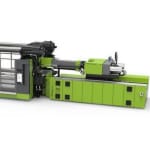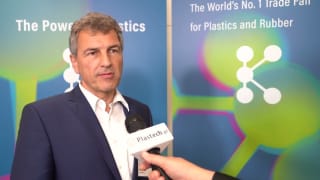 Composite lightweight construction based on thermoplastics promises more efficient manufacturing processes and the recycling of obsolete components. Until the innovative materials and processes are used on a large scale some challenges still need to be solved and more experience needs to be gained. The National Composites Centre (NCC) in Bristol, UK, has set itself both these goals. An integrated manufacturing cell for overmoulding fibre-reinforced semi-finished products from Engel is paving the way for mass production in both automotive and aerospace industries.
Composite lightweight construction based on thermoplastics promises more efficient manufacturing processes and the recycling of obsolete components. Until the innovative materials and processes are used on a large scale some challenges still need to be solved and more experience needs to be gained. The National Composites Centre (NCC) in Bristol, UK, has set itself both these goals. An integrated manufacturing cell for overmoulding fibre-reinforced semi-finished products from Engel is paving the way for mass production in both automotive and aerospace industries.The automotive industry and aircraft construction have traditionally been among the most important industrial sectors in the United Kingdom, where composite research and processing has established itself to an equally high degree. Catapult plays an important role in this. Comparable to the Fraunhofer Society in Germany, Catapult bundles top-level application-oriented research in the United Kingdom and supports the industry to profit more quickly from new technologies. "We act as a kind of catalyst," says Paul Gallen, Sector Lead Automotive at NCC. The NCC is one of seven institutes which form the Catapult Network, each with its own thematic focus.
Founded in 2012, the NCC currently comprises 17,500 square meters with state-of-the-art manufacturing cells for a wide variety of composite technologies. More than 220 engineers and scientists employed there work closely with the University of Bristol, many other universities worldwide and above all with the industry. Companies – not only from the UK – use the capacities for their own development projects. "We are continuously comparing our roadmap with that of the automotive manufacturers," says Gallen. "The increased use of thermoplastic materials in lightweight composite construction is high on both agendas."
There are two main driving forces behind this development: "On the one hand, thermoplastic matrix materials enable efficient further processing of semi-finished products in an injection moulding machine and functionalization with materials from the same material group in a fully integrated, automated process," explains Christian Wolfsberger, Business Development Manager Composite Technologies at Engel's headquarters in Schwertberg, Austria. "Process integration and automation are the prerequisites for achieving the unit costs required by the high-volume automotive industry. On the other hand, thermoplastic composites simplify the subsequent recycling of components, which is in line with the trend towards circular economy."

"The industry we serve is still emerging: The production of composite components in large quantities," says Paul Gallen (2nd from right) from the NCC. From left: Sean Cooper (NCC), Graeme Herlihy (ENGEL), Christian Wolfsberger (ENGEL).
The technological basis for the processing of thermoplastic fibre composites is expanding rapidly. A pioneering role is being taken by organo sheets, which are already being used in series production, particularly in the sporting goods industry. The first applications were recently launched in the automotive industry. "There is great potential," emphasises Graeme Herlihy, President Western Europe of Engel. "All OEMs and Tier 1 suppliers are working hard on this issue."




